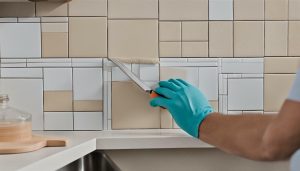Ants may look harmless, but they can quickly become a nuisance when they invade your kitchen. These tiny creatures can crawl into your food, create unhygienic living conditions, and can even damage your property. So, it’s essential to know how to eliminate them effectively.
In this article, we’ll go over several smart and safe methods for getting rid of ants in your kitchen, including natural ant remedies, ant control tips, DIY ant control, ant prevention methods, effective ant removal, home remedies for ant infestation, non-toxic ant control, and steps to eliminate ants in the kitchen.
Key Takeaways
- Ants can quickly become a nuisance when they invade your kitchen.
- Several smart and safe methods can help you eliminate ants, including natural ant remedies, ant control tips, and DIY ant control.
- Avoid food spillage and maintain cleanliness to prevent ant infestations.
- Sealing entry points and regularly maintaining hygiene can help prevent future ant infestations.
- If ant infestation persists, it’s best to seek professional ant control methods.
- Home remedies such as vinegar, lemon, and cinnamon can also help repel ants.
Identifying the Ant Species in Your Kitchen
Before you start to eliminate ants in your kitchen, it is essential to identify the ant species. This can help you determine the best methods and products to use for ant control. There are several types of ants that may invade your kitchen in search of food. Common kitchen ant species include:
| Ant Species | Description |
|---|---|
| Odorous house ants | Small brown-black ants with a distinct, slightly sweet odor when crushed. |
| Argentine ants | Small to medium-sized dark brown ants that often form large colonies. |
| Pavement ants | Small brown ants that often construct their nests in cracks in pavement or walls. |
Identifying the ant species can be challenging because many ants look similar, and it may require the assistance of a pest control professional. Once you have identified the species invading your kitchen, you can determine the most effective ant control methods to use.
Removing Food Sources and Maintaining Cleanliness
One of the most effective ant prevention methods is to remove their food sources and maintain cleanliness in the kitchen. Ants tend to come inside looking for food, and if they find a source, they will keep coming back for more.
To remove their food sources, start by storing food items in airtight containers and keeping them off the kitchen counter. Clean up any spills or crumbs immediately, and remember to wipe down surfaces regularly. Doing so will remove any scent trails left by previous ants and prevent new ones from forming.
You can also try placing bay leaves, cinnamon, or peppermint around the kitchen, as these scents are known to repel ants. Additionally, avoid leaving pet food out for extended periods and clean their bowls regularly.
To maintain cleanliness in the kitchen, make sure to take out the trash before it overflows and clean any dirty dishes promptly. Sweeping and mopping the floors regularly will also help prevent any food particles from attracting ants.
Overall, removing food sources and maintaining cleanliness are essential ant prevention methods that can help keep your kitchen ant-free.
Natural Remedies for Ant Control
If you’re looking for a natural way to get rid of ants in your kitchen, there are several options that are safe and effective. Not only are these remedies better for the environment, but they can also be more cost-effective than professional ant control methods.
Natural ant remedies such as vinegar, lemon juice, and cinnamon are great DIY ant control options. These ingredients disrupt the ants’ scent trails and make it harder for them to find their way back to your kitchen.
If you’re dealing with a large ant infestation, you can use a non-toxic ant bait made from sugar and borax. Mix equal parts of sugar and borax with enough water to make a syrup. Soak cotton balls in the syrup and place them near ant trails or nests. The sugar will attract the ants, and the borax will kill them.
DIY ant control can also involve using physical barriers to prevent ants from entering your kitchen. You can create a barrier using natural substances such as diatomaceous earth, which is a powder made from fossilized algae. Sprinkle the powder around entry points, and it will dehydrate the ants’ exoskeletons, killing them.
When using natural remedies for ant control, it’s important to remember that they may take longer to work than chemical pesticides. However, they are safer for you, your family, and your pets, and they can be just as effective with patience and persistence.
Sealing Entry Points
One of the most effective ways to prevent ants from entering your kitchen is by sealing off all entry points. These tiny insects can easily find their way through small gaps and cracks, so it’s essential to seal off any openings that lead into your home.
Begin by inspecting the exterior of your home, looking for any cracks or gaps in the foundation, walls, or around windows and doors. Use caulk or weather-stripping to seal off any openings you find. You can also use spray foam insulation to fill in larger gaps.
Don’t forget to check inside your home as well, focusing on areas around pipes, electrical outlets, and baseboards. Seal off any openings with silicone caulking or foam insulation to prevent ants from entering.
In addition to sealing off entry points, it’s also essential to keep your kitchen clean and free of food debris. Ants are attracted to food sources, so by removing these sources and maintaining cleanliness, you can further deter ants from entering your kitchen.
Following these ant prevention methods, including sealing entry points and maintaining cleanliness, can help you eliminate ants in your kitchen and keep them from returning in the future.
Professional Ant Control Methods
If natural remedies don’t work, it’s time to bring out the big guns in ant control. There are many professional ant control methods available that can effectively remove ants from your kitchen. Here are some tips:
Identify the type of ant: Knowing what type of ant you are dealing with can help determine the best method of removal. Consult a pest control professional for an accurate identification.
Use ant bait: Ant bait is a mixture of food and poison that the ants will take back to their nest, killing the entire colony. Place the bait in areas where ants are active.
Apply insecticides: Insecticides can be effective in killing ants but should be used with caution. Follow the instructions carefully and keep children and pets away from treated areas.
Seal entry points: Use caulk or weatherstripping to seal any cracks or gaps in your walls, floors, and windows to prevent ants from entering your kitchen.
Seek professional help: If the infestation is severe or if DIY methods are not effective, it’s time to call in a professional pest control service. They have the expertise and equipment to eliminate ants safely and effectively.
By following these professional ant control tips, you can say goodbye to ant infestations in your kitchen for good.
Maintaining Long-Term Prevention
Eliminating ants from your kitchen is just the first step. To ensure that they don’t return, you need to take proactive measures and implement ant prevention methods. By following these steps, you can maintain long-term prevention against ants in your kitchen.
- Identify and seal entry points: Conduct regular checks around your kitchen and identify any cracks, holes, or gaps where ants could enter. Seal them using a sealant or caulk to prevent ants from invading your space.
- Remove food sources: Keep your kitchen clean and tidy at all times. Wipe down counters, sweep the floors, and store food in airtight containers. Ants are attracted to sweet and sticky substances, so make sure to clean any spills or crumbs immediately.
- Use natural remedies: If you want to avoid using toxic chemicals, try natural ant remedies such as vinegar, peppermint oil, or cinnamon. These can repel ants and keep them away from your kitchen.
- Regularly maintain cleanliness: Keep your kitchen tidy and free from clutter. Ants are attracted to dirt and debris, so make sure to clean up spills and crumbs as soon as possible. Give your kitchen a deep clean every few weeks to ensure it remains hygienic.
By following these steps, you can maintain a clean and ant-free kitchen. Remember that prevention is always better than cure. Being proactive and taking preventative measures can save you time, money, and frustration in the long run.
Home Remedies for Ant Infestation
Dealing with an ant infestation in your kitchen? Don’t worry, there are natural ant remedies you can try that are both effective and safe. Here are some of the best home remedies for ant infestation:
- Vinegar: Mix equal parts of vinegar and water in a spray bottle and apply it to areas where ants are present. The strong odor of vinegar will repel ants and disrupt their scent trails.
- Baking soda and powdered sugar: Mix equal parts of baking soda and powdered sugar and sprinkle it in areas where ants are present. Ants will be attracted to the sugar but the baking soda will kill them.
- Lemon juice: Squeeze fresh lemon juice around entry points and areas where ants are present. The acidic nature of lemon juice will disrupt ants’ sense of smell.
- Cinnamon: Sprinkle cinnamon powder in areas where ants are present. The strong odor of cinnamon will repel ants.
- Cayenne pepper: Sprinkle cayenne pepper in areas where ants are present. The spicy nature of cayenne pepper will repel ants.
These home remedies for ant infestation are non-toxic and safe to use around children and pets. However, it’s important to note that these remedies may not be as effective as professional ant control methods if the infestation is severe.
Maintaining Hygiene Effortlessly
Maintaining hygiene is crucial in preventing ants from infesting your kitchen. Regularly cleaning surfaces and wiping up spills, particularly sweet and sticky ones, will eliminate any food sources that may attract ants.
One effective ant prevention method is to store food in airtight containers, preventing ants from accessing them. This also includes keeping fruits and vegetables in the refrigerator instead of on the counter.
Another tip for effortless hygiene maintenance is to sweep and mop floors regularly, removing any crumbs or spills that ants may be attracted to. Additionally, taking the trash out regularly and wiping down trash cans will prevent any food residue from accumulating.
Conclusion
Ants can be a nuisance in any home, especially in the kitchen where they are most attracted to food sources. But with the right knowledge and methods, it is possible to get rid of them safely and effectively. By identifying the ant species in your kitchen, removing food sources and maintaining cleanliness, using natural remedies for ant control, sealing entry points, and considering professional ant control methods when necessary, you can eliminate ants and prevent them from returning.
Additionally, by maintaining good hygiene practices in your kitchen and keeping it clean, you can make it less attractive to ants in the long run. Remember, prevention is key to keeping them away. With these tips and tricks, you can ensure a clean and ant-free kitchen, making mealtime a more enjoyable experience.
FAQ
Q: How can I get rid of ants in my kitchen?
A: There are several smart and safe methods to eliminate ants in your kitchen. Here are some effective ant control tips and natural ant remedies you can try:
Q: How do I identify the ant species in my kitchen?
A: Identifying the ant species can help determine the best course of action for ant control. Look out for specific characteristics and behavior patterns to identify the ant species in your kitchen.
Q: What can I do to remove food sources and maintain cleanliness?
A: Removing food sources and maintaining cleanliness is crucial for ant prevention. By keeping your kitchen clean and storing food properly, you can minimize the attraction for ants.
Q: Are there any natural remedies for ant control?
A: Yes, there are natural remedies you can try for DIY ant control. These non-toxic ant control methods often involve using ingredients found in your home, such as vinegar, citrus peels, or essential oils.
Q: How can I seal entry points to prevent ants from entering my kitchen?
A: Sealing entry points is an important step in ant prevention. By sealing cracks and gaps in doors, windows, and walls, you can create a barrier that discourages ants from entering your kitchen.
Q: What are some professional ant control methods?
A: If DIY methods are not effective, you may consider professional ant control services. These experts can use specialized techniques and products to eliminate ants from your kitchen.
Q: How can I maintain long-term prevention of ants in my kitchen?
A: To maintain long-term prevention, it is important to follow ant prevention methods consistently. By practicing good hygiene, sealing entry points, and addressing any ant issues promptly, you can keep your kitchen ant-free.
Q: Are there any home remedies for ant infestation?
A: Yes, there are home remedies you can try for ant infestation. These natural ant remedies often involve using ingredients like baking soda, cornstarch, or coffee grounds to deter ants.
Q: How can I effortlessly maintain hygiene in my kitchen?
A: By following ant prevention methods, you can maintain hygiene effortlessly. Regular cleaning, proper food storage, and prompt disposal of trash can help prevent ant infestations.

It’s me, Amber Hayden, the heart and soul behind SagarmathaOnlineMedia.com. From a young age, I’ve been head over heels for everything home-related, from interior decor to gardening. I’m the type who can’t resist a well-crafted piece of furniture, and I firmly believe that a home isn’t complete without a pet or two. But it’s not just about creating pretty spaces for me. I’m all about making homes that tell a story reflecting the people living there. SagarmathaOnlineMedia.com is my way of sharing this passion with you. Whether you’re looking for tips to jazz up your living room, advice on pet care, or ideas to make your garden bloom, I’m here to help. So, let’s embark on this journey together and make your house a home!



